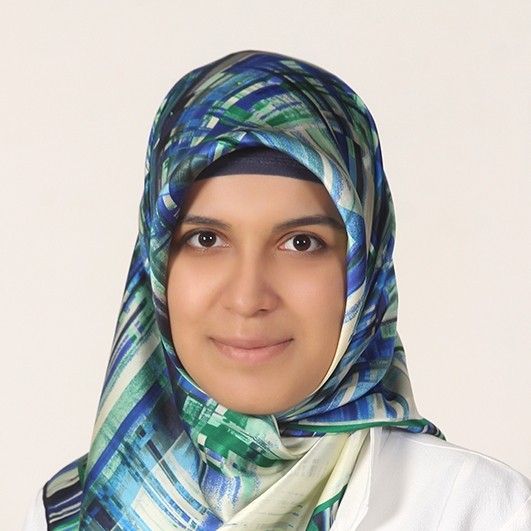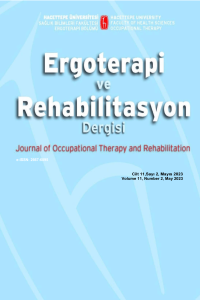Clinical Research
Aim & Scope
Journal
of Occupational Therapy and Rehabilitation includes concerning
all aspects of occupation, occupational therapy, rehabilitation, social
participation of people with/or without problems of body structure and
functions and studies about knowledge, skills and experiences to improve personal and social
competence in rehabilitation.
Journal
of Occupational Therapy and Rehabilitation invites submission of original
articles, review articles, case reports and letters to the editor. Journal
of Occupational Therapy and Rehabilitation is a peer-reviewed journal and it is
published three times a year. Official language of the journal is Turkish but both
Turkish and English articles are considered for publication.
Author Guidelines
Preparation of Manuscript
Articles should be typed in A4 paper with 12 pt (Times New Roman) and doublespaced. Row numbers must be added in text. Original articles should not exceed 5000, review articles 3000, case reports 2000 and letters to editor should not exceed 500 words. The article should include objective, material and method, results and conclusion. Case reports should also include a structured abstract [objective, case report(s), and conclusion]. Letters to editor should give the name of the reffered article, number and the date of the journal, name of the writer of the letter with complete affiliations, and the address. The authors of the publised manuscripts do not paid.
Scientific Responsibility
Copyright Transfer Form signed by all authors must be send with the manuscript during submission. Autors are responsible for thier manuscripte conformity to ethical rules. The manuscriptes without ethical committe approval will not be published. Authors should obey the rules in “Helsinki Declaration”, “Good Medical Practice Guidelines’’ and must declare ‘’Informed Consent Form’’ is signed by all the participants of the study and can present them if needed.
Title Page
The title page should contain the article title, authors’ names, complete affiliations, e-mail adress, ORCID ID, and address for manuscript correspondence including e-mail address, ORCID ID, telephone and fax numbers. If the article was presented at a scientific meeting, authors should provide a complete statement including date and place of the meeting.
Abstract and Key Words
Original articles should contain Turkish and English abstracts. For foreign authors, Turkish abstract and key words will be written by the editorial board. Abstracts must be no longer than 200 words. Abstract should include purpose, material and method, results and conclusion in original articles. Review articles and case reports should also include a structured abstract without titles. Letter’s to editor should not include abstract.
The authors should list three to five key words or phrases. Turkish keywords should be selected from Terms of
Sciences of Turkey (http://www.bilimterimleri.co I); english keywords should be selected from ‘’Medical Subject Headings (MeSH)’’ (http://www.nlm.nih.gov/mesh/MBrowser.html) and ‘’BISAC Subject Headings’’ (http://www. Bisg.org/ what-we-do-20-73-bisac-subject-headings-2012 edition.php). Turkish keywords should be translation of MeSH. Keywords must be separated by (;).
Main Headings
Introduction heading should not be used in manuscript. Main headings should be Material and method, Results, and Discussion. If it is needed the acknowledgements are placed at the end of the article, before the references.
References
The author is responsible for the accuracy of the references. The list of the references at the end of the paper should be given according to alphabetical order and using the abbreviations for the journal name, if the jounal does not have abbrevation use the full name. Examples for the references are given below:
- Jones, M. W., Branigan, H. P., & Kelly, M. L. (2008). Visual deficits in developmental dyslexia: relationships between non-linguistic visual tasks and their contribution to components of reading. Dyslexia, 14(2), 95-115.
- Van Uffelen, J. G., Wong, J., Chau, J. Y., van der Ploeg, H. P.,Riphagen, I., Gilson, N. D., et al. (2010). Occupationalsitting and health risks: a systematic review. Am JPrev Med, 39(4), 379-388.
- Johnson, J. A. (1986). Wellness and occupational therapy. Am J Occup Ther,40, 753-58.
- Rigby, L., & Wilson I. (2017). Occupational therapy interventions for someone experiencing severe and enduring mental ilness. In C. Long, J. Cronin-Davis., & D. Cotterill (Eds.), Occupational Therapy Evidence in Practice for Mental Health, (Second Edition, pp.109-139). UK: WILEY Blackwell.
-Plonsky, M. (2004). Psychology with style: A hypertext writing guide (Version 5). Retrieved from the Web January 10, 2004. http://www.uwsp.edu/psych/apa4b.htm
-U.S. Department of Health, Education, and Welfare. (1971). Alcohol and Health. Washington, DC: U.S. Government Printing Office.
Tables, Figures and Illustrations
Tables, figures and illustrations should be typed in
order of mention in the text on a seperate page following the referances.
Tables, figures and illustrations should include a short descriptive title. Illustrations
should be given JPEG.
Ethical Principles and Publication Policy
Ethical Principles and Publication Policy
The Journal of Occupational Therapy and Rehabilitation observes the condition that all articles published in its body are of high ethical and scientific standards. There are ethical rules that editors, referees and authors must comply with in all processes of the articles examined for publication in our journal.
The said rules and the standards to be followed are the document named Code of Conduct and Best-Practice Guidelines for Journal Editors published by the Committee on Publication Ethics (COPE) (https://publicationethics.org/files/). Code_of_conduct_for_journal_editors_Mar11.pdf) and the document named Uniform Requirements for Manuscripts Submitted to Biomedical Journals published by the International Committee of Medical Journal Editors (http://www.icmje.org).
All studies submitted to our journal are required to comply with the following ethical issues:
• Requiring ethical committee approval; Ethics committee approval should be obtained for all studies with humans or animals, this approval should be stated in the method section of the article along with the name of the ethics committee, the number of decisions and the date, and should be documented during the upload of the article documents. All studies that require ethical committee approval are detailed below.
•In all studies with humans, information about obtaining informed consent should be included in the method section of the article.
• The statement that the Research and Publication Ethics is complied with in the planning and execution of the study should be included in the article.
Ethics committee approval is required for ALL of the studies listed below:
• Any kind of research carried out with qualitative or quantitative methods that requires data collection from the participants by using survey, interview, focus group work, observation, experiment, interview techniques,
• Research involving the use of humans and animals for scientific purposes in any context and scope,
o Clinical studies on humans,
o Clinical studies on animals,
• Retrospective (file scanning, etc.) studies using information and data belonging to people (in accordance with the personal data protection law).
Editors, referees and authors have separate responsibilities in all articles published or to be published in our journal.
Editors' responsibilities
Decisions regarding all articles submitted to the journal for review for publication are taken together with the editor and field editors. Decisions taken during this process cannot under any circumstances be dependent on the race, gender, sexual orientation, religious beliefs, ethnic origins, nationalities or political views of the authors and/or be affected by these characteristics of the authors. The decision about the article depends entirely on the importance of the article in the scientific context, its suitability for the scope of our journal, its originality, the fact that it was carried out with valid and reliable methods, and its content is understandable. Chief editor, field editors and technical editors, information about the articles submitted to them; It cannot be shared with anyone other than other editors, referees and authors. During the sharing of information with the referees, the identities of the authors cannot be disclosed under any circumstances. Any information or material (images, figures, diagrams, etc.) obtained from the content of an article under review by the journal boards cannot be used elsewhere without the express and written permission of the authors. Where it is used, the person using it should also share the written permission from the authors.
Responsibilities of the Referees
The purpose of the peer-review process is not to ensure that the reviewed article is published, but to assist the editor and assistant editors in making decisions about the article. To facilitate this decision, reviewers can provide suggestions for improving the article.
The referees should treat all articles and other documents related to the article with absolute confidentiality. The referees cannot share the documents of the article or the parts taken from the content of the documents with anyone other than the person or persons authorized by the editor directly. Since our journal is double-blind and refereed, the authors and referees cannot know each other's identities in any way. If the referee learns or deduces the identity of the authors in any way, he is obliged to notify the editor immediately. In this case, the referee's duty in the relevant article is terminated and another referee is assigned.
Referees also identify the problems that exist in terms of citing references in the article they have reviewed. In this context, if a publication cited in the content of the article is not cited in the bibliography section, the referee should determine this situation. In addition, the referees are obliged to notify the editor in case they detect significant similarities between the article they have reviewed and other publications they know.
The referees must make all their reviews on our own. Although the referee has a certain opinion about a scientific concept, it is one of the referee's greatest responsibilities to review the article on the same or a similar concept completely without prejudice. All evaluations and suggestions for improvement by the referee must be based on objective grounds and personal opinions cannot influence these evaluations.
The person invited to referee should promptly notify the editor if he/she can act as a referee. In addition, the referee who has accepted to act as a referee is responsible for notifying the editor without delay if he or she cannot perform his/her refereeing duties quickly and effectively due to a new situation.
Authors' duties
Authors of original research papers should include sufficient detail and references in the "methods" section to allow others to replicate the work. Making fraudulent or knowingly false statements constitutes unethical behavior and is unacceptable.
In some cases, authors may be asked for raw data on their work. When sharing of data is appropriate, the data should be shared by the responsible author by making absolute anonymization.
One of the biggest responsibilities of writers is to produce completely original works. If it is determined that all or part of a study reviewed in our journal is not the original product of the authors, the article will be rejected directly. Therefore, authors should compose their articles originally and appropriately cite statements and sections taken from other publications.
It is unethical behavior for a publication under review in our journal to be under review in another journal in the same or substantially similar way. In order to avoid this situation, the authors cannot apply to another journal before a final decision about their article is made from a journal or they withdraw their articles from the journal.
Articles that were previously published as a copyrighted document, document or material elsewhere in the same or substantially similar way cannot be sent to our journal.
Authorship should be with individuals who have made significant contributions to the conceptualization, design, execution or interpretation of the reported work. Anyone who has made significant contributions should be listed as a co-author. Accordingly, anyone who has not made a meaningful contribution to the article should not be listed as an author. The corresponding author ensures that there is no other non-contributory co-author on the list of authors other than all contributing co-authors. The corresponding author is also responsible for confirming that all co-authors have approved the final version of the article and agreed to submit it for publication.
All authors must make a statement disclosing any financial or other material conflicts of interest that may be considered to affect the conclusion or interpretation of their article.
If an author detects a material error or inaccuracy in his or her published work, it is the author's obligation to promptly notify the journal editor or publisher and cooperate with the editor to correct or withdraw the article via an error correction form.
Open Access Publication Policy
The journal «Occupational Therapy and Rehabilitation» provides immediate open access to its content on the principle that making research freely available to the public supports a greater global exchange of knowledge. Full-text access to scientific articles of the journal is presented on the official website
Open Access Licenses
Journal of Occupational Therapy and Rehabilitation © 2013 by Hacettepe University is licensed under CC BY 4.0. To view a copy of this license, visit http://creativecommons.org/licenses/by/4.0/
Price Policy
Dergimize gönderilen makalelerden, hiçbir aşamada ve hiçbir bağlamda ücret alınmamaktadır.
Indexes
Journal Boards
Editorial Board


Sinem Kars 2023 yılında Hacettepe Üniversitesi Sağlık Bilimleri Enstitüsü Ergoterapi Doktora Programından mezun olmuştur. Ocak-Eylül 2025 tarihleri arasında University of Kansas Department of Occupatinal Therapy Education'da doktora sonrası araştırmacı olarak çalışmalarına devam etmektedir. Otizm, katılım, ebeveyn, iyilik hali, psikolojik sağlamlık, oyun ve oyunseverlik çalışma alanlarıdır.
Doç Dr. Gökçen Akyürek: 2004 yılında Hacettepe Üniversitesi Fizik Tedavi ve Rehabilitasyon Yüksekokulu'nda lisans eğitimini tamamladı. 2009 yılında Sağlık Bilimleri Enstitüsü Ergoterapi Programında yüksek lisans eğitimine başladı ve 2011 yılında bilim uzmanlık, 2017 yılında Doktora derecesini aldı. 2014-2019 yılları arasında Hacettepe Üniversitesi Sağlık Bilimleri Fakültesi Ergoterapi Bölümü'nde Araştırma Görevlisi olarak çalıştı. 2019 yılında H.Ü. Sağlık Bilimleri Fakültesi Ergoterapi Bölümüne Öğretim Üyesi olarak atandı. 2020 yılında Doçent ünvanı alan Akyürek, Hacettepe Üniversitesinde Ergoterapi lisans, yüksek lisans ve doktora dersleri vermektedir.
Halen Hacettepe Üniversitesi Sağlık Bilimleri Fakültesi Ergoterapi Bölümünde görevini sürdürmekte olup, 2015’den beri de Sağlık Bilimleri Eğitim Programları Değerlendirme ve Akreditasyon Derneği (SABAK) kurucu üye olarak görev yapmaktadır.


Journal of Occupational Therapy and Rehabilitation by Hacettepe University, Faculty of Health Sciences is licensed under Attribution-NonCommercial 4.0 International








